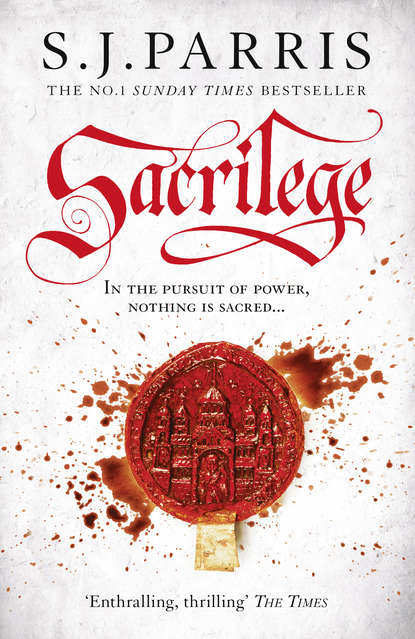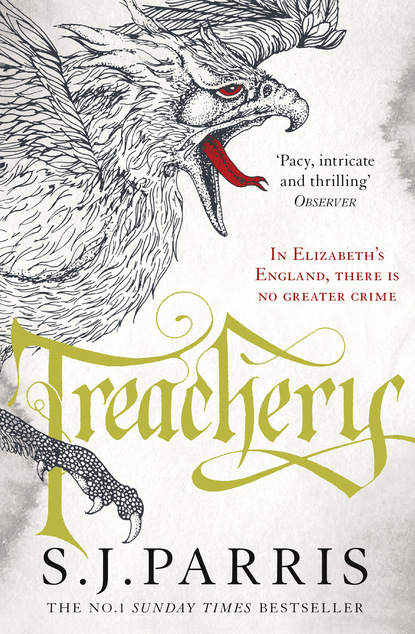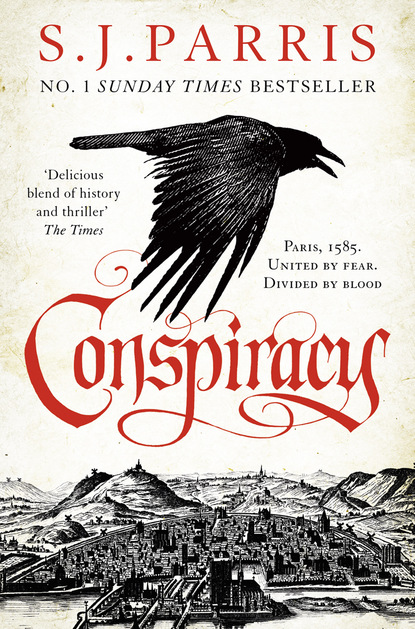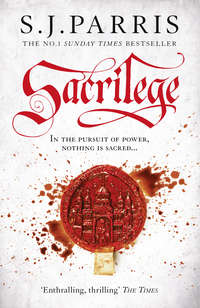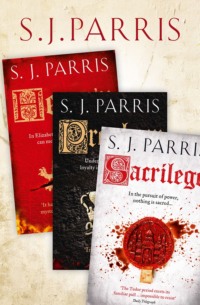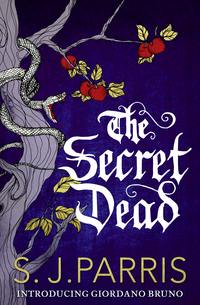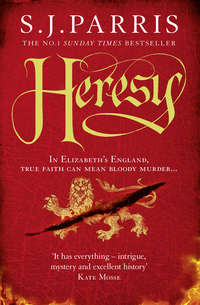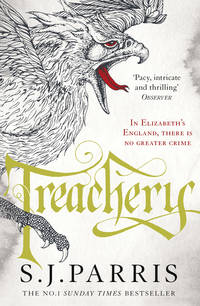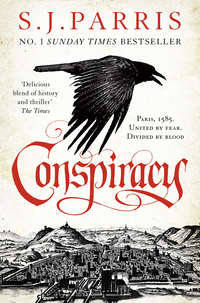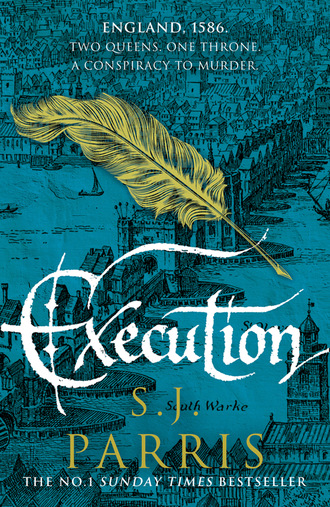
Полная версия
Execution
‘You are a natural, Bruno,’ Frances said, as if I had passed a test. ‘Now when you next write to Philip, you can tell him you have held his daughter in your arms. Which is more than he has ever done. But’ – her eyes lit up – ‘next month, God willing, she and I sail for Flushing to join him. The Earl of Leicester himself is making the arrangements.’
‘Your father will let you?’ I lowered the infant, who shrieked immediately to repeat the game, confirming my theory that all children are tyrants, and tyrants merely children who have never been refused.
Frances’s face darkened. ‘He will not dare oppose Sir Philip and the Earl together. Besides, my husband is my master, not my father.’
I nodded quickly. In the ordinary course of events, this would be true. A woman’s duty passed to her husband on her marriage, but theirs was not an ordinary situation; Walsingham had quietly dispatched thousands of pounds of Sidney’s debts on the joining of the two families, and given the young couple this fine house to live in, since Sidney’s youthful extravagance meant he could not afford to provide a home for his wife and daughter. I had always supposed there was little question about who was master in this household. Sidney’s desire to go to war had been partly prompted by the need to escape the weight of being beholden to his father-in-law.
‘But if this business with Clara is not resolved,’ Frances continued, biting at the edge of her thumb, ‘my father may fear further danger and hesitate to let me travel alone.’ She gave me a long look, until she was certain I understood what was at stake, and the part she wanted me to play. This, I supposed, was my cue to ask why the death of her companion should prevent her from travelling to the Low Countries – I guessed it must be to do with the ‘complications’ she had hinted at surrounding the girl’s murder – but before I could form the question, the steward Marston burst through the door carrying a silver jug and a linen towel, his face flushed with his news.
‘My lady, Sir Francis has arrived early, with Thomas Phelippes.’ He glanced at me, exaggerating his surprise at seeing me holding the baby aloft. ‘Should I show this man out while you greet your father? He has the dust of the road on him still.’
‘Certainly not. My father is not squeamish about a bit of sweat, Marston. He will be almost as delighted to see Bruno as he is to see Lizzie.’ She turned to me. ‘He dotes on that child. If the Queen of Scots ever saw the doe-eyed grandfather inventing rhymes, singing nursery ditties, braying like a donkey and I don’t know what other nonsense, she would never fear him again.’
‘You had better watch that the Catholics don’t recruit the baby to wheedle her way past his defences,’ I said, smiling.
Marston cut me a disapproving look. I could not picture Master Secretary’s dour, terse expression softening to impersonate animals, though I had glimpsed Walsingham’s more human side now and again when I was last in his service. It was not an aspect of his character he showed often; he wished to be perceived as unbending in his devotion to the security of the realm. Perhaps he needed to believe it himself. Above me, the baby gurgled and released a spool of spittle on to my forehead.
‘Where is my little kitten?’ called that familiar dry voice from the corridor, to the beat of quick footsteps, and here he was, striding across the chamber, dressed head to foot in black as always, his hair greyer under the close-fitting skullcap, his beard too, and his face thinner than when I had last seen him, nearly a year ago. He stopped in his tracks halfway across the room and a broad smile creased his long face.
‘Good God in Heaven. Two people I never thought to see in an embrace.’ He gave his daughter a perfunctory pat on the shoulder on his way past, but his attention was all for the baby, who shrieked in delighted recognition and strained out of my arms towards him. ‘Well, well. Giordano Bruno. So you have come hotfoot all this way from Paris to see the newest shoot of the Walsingham tree, eh?’
‘She’s a Sidney,’ Frances said, her voice tight. I noticed how she hung back; her father managed to command all the space in the room, though he was not a tall or broad man. He laughed and held out his arms for the child; I passed her over gladly.
‘What say you, Bruno?’ He pinched the baby’s cheek while she tugged at his beard and burbled. ‘She has the Walsingham shrewd eye, does she not, and witness the firm set of her jaw? None of your aristocratic foppishness in this little chin, is there, my dove?’
I stood, straightened my clothes, and effected a bow, though he was so absorbed in his granddaughter, he would not have noticed if I had pulled down my breeches.
‘She combines the perfection of all the virtues of her illustrious forebears on both sides, Your Honour.’
‘I see you have been perfecting the empty flattery that passes for diplomacy at the French court,’ he said, giving me a sidelong glance at last. ‘For a more honest answer I shall have to seek the opinion of Master Phelippes. Thomas, what say you – is my granddaughter a Walsingham through and through?’
The man standing patiently in the doorway now stepped forward. Thomas Phelippes, Walsingham’s most trusted assistant and master cryptographer, was unremarkable in appearance – early thirties, thinning sandy hair, long face, his cheeks pitted with smallpox scars – but his looks belied a singular disposition. Phelippes boasted a phenomenal memory, a source of great fascination and envy to me, since it appeared to be the result of a natural gift rather than determined study – he had merely to glance over a cipher once and could not only commit it to mind but analyse and unpick it in the same instant. But he also had a way of not meeting your eye, and an almost comical resistance to the finer points of tact and social niceties. If Phelippes thought you were an idiot or your breath smelled, he would tell you outright, though without malice, finding no need for a polite falsehood. I found his honesty refreshing, if occasionally disconcerting, and liked him, though I sensed that being liked by me or anyone else made no difference to him either way. He put his head on one side and considered the baby.
‘She has enough semblance of the Sidney family to allow for a reasonable degree of certainty about her paternity,’ he said, matter-of-factly. Lady Sidney made a little noise of indignation. ‘Theories of generation differ as to whether the female can imprint characteristics on the growing infant, or is merely a receptacle for the male seed, and as yet there is no conclusive evidence either way. This one is so young it is presently impossible to gauge the quality of her mind. Being female one would naturally expect it to be weaker, so if you are asking whether you can expect to see echoes of your own traits in her, Your Honour, you will probably be disappointed. But this is not really my field of expertise,’ he added, with a shrug.
Walsingham chuckled, largely at his daughter’s bunched fists and tight expression. ‘Well, Frances, there you have it. You will want to occupy yourself with the child and supper, I expect,’ he said, handing the baby back to her. ‘I will speak with Bruno in my study. Call us when the food is ready.’
Lady Sidney watched us to the door, eyes dark with mute rebellion. I guessed she was biding her time before suggesting my involvement in the business of her companion to her father, and I hoped I might pre-empt her request.
Though Walsingham had given the Seething Lane house over to Sidney and his wife, he had taken care to make clear that the arrangement was temporary; all the furnishings remained Walsingham’s own, and he had kept his large, book-lined study at the back of the house for use when he was in town. Now he settled himself comfortably behind his desk opposite the fireplace, cast an eye over a pile of letters, moved them to one side and motioned me to a seat. Phelippes took his place at a second desk set against the back wall and bent his head over a leather folder of papers as if no one else were present.
‘So. Urgent news from Paris, I presume.’ Walsingham steepled his fingers and watched me.
I reached into my pack and passed the wallet containing the letters across the desk to him. He turned it carefully between his fingers but did not open it immediately. ‘Give me the meat of it. Thomas will transcribe it later.’
‘Nicholas Berden intercepted a letter from Charles Paget to Mary Stuart, written four days ago. There is an English priest arrived in Paris this last fortnight disguised as a soldier – one Father John Ballard, claims he is part of a well-advanced plot to murder Queen Elizabeth and spring Mary from her prison to take the throne. Paget took him last week to the Spanish ambassador, where this Ballard assured them both that English Catholics at strategic points across the land have pledged to rise up and assist an invading army, if King Philip of Spain will commit troops and money. They believe the timing is apt, with so many of England’s fighting men away in the Low Countries.’ I paused for breath, amazed to see a wide smile spread slowly across Master Secretary’s face.
‘Well, this is excellent news, Thomas, is it not?’ He appeared delighted.
‘We could not have hoped for better,’ Phelippes replied, without looking up from his papers.
I stared at Walsingham, thrown by his reaction.
‘Forgive me, Your Honour, but Berden believes this intelligence to be credible. That is why he sent me with all speed – he dared not trust the diplomatic courier.’
‘I have no doubt that Berden’s intelligence is entirely accurate. He is one of my best men. This is the very letter I have waited for – and from Paget too, the horse’s mouth.’ He gave me a knowing nod, his eyes alight with anticipation. I grimaced. Charles Paget was the self-appointed leader of the English Catholic exiles in Paris; it was he who coordinated links between the extremist Catholic League in France, led by the Duke of Guise, and the English conspirators who wanted to replace Queen Elizabeth with her cousin. He had been behind the plot in ’83, and my encounter with him in Paris had almost cost me my life before Christmas. Walsingham tapped the letter, impatient. ‘What more?’
‘Ballard says he has a band of devout men in London committed to carrying out the execution of Queen Elizabeth. That is the term they use to absolve themselves of regicide.’
‘Good. Names?’
‘Not set down in writing. But Ballard returns to London imminently to further his preparations. Ambassador Mendoza promised he would send one of his men here directly – a Jesuit priest – to bring the conspirators funds, though he has not yet gone so far as to commit Spain to military support. Paget guesses that this Jesuit’s task is to sound out their seriousness and report back to Mendoza, though he tells Mary to take heart, he is sure Spain will champion her cause.’
‘Marvellous. I look forward to hearing more of their progress.’ Walsingham sat back in his chair and folded his hands together, smiling to himself, showing surprisingly white teeth.
‘You do not seem overly concerned,’ I remarked. In truth, I could not help feeling resentful at the reception of my news; I had expected a mix of shock and gratitude, and a flurry of activity as Walsingham rushed to apprehend the plotters and warn the Queen, quietly mentioning my name as the bearer of this timely intervention. Instead, even by Master Secretary’s standards, this reaction seemed unusually phlegmatic.
‘Ah, Bruno. Do not think I don’t appreciate the efforts you have made to bring me this news – I have been waiting for it. We’ve been monitoring John Ballard for some time, waiting for his plans to bear fruit. And now that the game begins …’ he paused, pulling at the point of his beard ‘… all we have worked for stands on a knife-edge. One false step could mar everything. You see?’
‘I’m afraid I don’t. I had not thought it was a game.’ I looked across to Phelippes for a plainer explanation, but his eyes remained fixed on his scratching nib.
Walsingham sighed. ‘Do you know how difficult it is to kill a queen, Bruno?’
‘I have never tried.’
‘Well, I have been trying for years, believe me. And now the means is almost at my fingertips. We cannot afford to fail this time.’
I watched him while his meaning gradually took shape. ‘You mean the Queen of Scots.’ I let my breath out slowly and felt a tremble. ‘You want her dead.’
‘That vixen.’ He pushed his chair back abruptly and strode to the window with his back to me, but I could see the suppressed fury in the set of his shoulders. ‘Every damnable conspiracy against the state and the Queen of England’s person these last twenty years – who is at the heart of it? That conniving Scottish witch. There she sits like a poisonous spider at the heart of her web, under house arrest, embroidering tapestries, complaining she is not kept in regal luxury. She protests her love for her cousin Elizabeth, while her words and letters embroider plots of murder and insurrection for her devoted followers in France. She wraps every gaoler I appoint around her finger with her simpering and her flirtations. It must end, Bruno, do you understand?’ He turned back to me, thumped his fist once on the wood panelling to make his point. ‘While she lives, the Protestant Church in England will never be secure. Her name is a banner to rally every angry young man who believes his fortunes would be better if the clocks could be turned backwards to a golden England of yesteryear, before the break with Rome. An England that exists only in his imagination, but no matter – he will plunge the country into ruin to recover it.’
‘But the Queen of Scots cannot be held responsible for what impetuous men do in her name, surely?’
Walsingham sank into the window seat as if the outburst had exhausted him, and I saw in his strained look why his daughter worried for his health. ‘Explain it to him, Thomas.’
Phelippes lifted his head and glanced at me briefly before shifting his gaze to the bookshelves.
‘Actually, she can now – Master Secretary has passed legislation this year to say exactly that. Mary Stuart is the granddaughter of the eighth King Henry’s sister,’ he said, in his odd, flat voice. ‘So for those English Catholics who hold that Henry’s divorce was not sanctioned by the Roman church and that his second marriage to the Queen’s mother Anne Boleyn cannot therefore be legitimate, Mary Stuart is the only true, Catholic heir by Tudor blood to the English throne. They maintain that Queen Elizabeth is a bastard.’
‘I know all this.’ I tried to conceal my impatience, but Phelippes had a manner of explaining that addressed his listener as if they were a slow child. ‘I was the one intercepting the letters from Mary’s supporters through the French embassy three years ago, the last time they tried a plot like this. But there was no evidence that Mary had given the conspiracy her approval.’
‘You understand the challenge, then,’ Walsingham said, his voice soft. I looked at him; his gaze did not waver.
‘You mean to entice her into betraying herself.’
‘The new law states that anyone who stands to benefit from the Queen’s murder is guilty of treason, even if they do not commit the deed with their own hand.’
‘Then – this plan of Ballard’s, that Paget mentions – it’s a trick?’
‘Oh, the plot is real enough.’ Walsingham stood, with evident effort, and returned to his desk, taking a small sip from his glass. ‘The invasion plans too, quite possibly, though I suspect Philip of Spain will think twice before reaching into his coffers again for a rabble of hot-headed Englishmen – he has heard all this before, remember, with the Throckmorton business in ’83?’
I nodded; my part in that was not an experience I would forget in a hurry.
‘But none of this worries you. You appear to have it all under control, so I see I have had a wasted journey.’ I heard the pique in my voice but was too tired to disguise it. As so often with Walsingham, I had the sensation of playing a hand of cards without being told the rules of the game. I wondered if Nicholas Berden knew the information he had risked so much to procure was already familiar to Walsingham, or if he too was being kept in the dark.
‘Far from it, my dear Bruno. It is never a waste to see old friends.’ He moved around the side of the desk and put an awkward arm around my shoulder, patting it briefly. A moment later he moved away – he was not a demonstrative man – and covered his embarrassment with a cough. ‘In fact, since you are here, a thought occurs to me – but you must allow me a pause while it takes shape. Thomas’ – he clicked his fingers in Phelippes’s direction – ‘decipher that letter as quickly as you can – I want to know about this Spanish Jesuit Mendoza is sending. In the meantime, Bruno, you must wash, and eat, and we will talk further.’
He handed me my pack and showed me to the door, patting my shoulder again for reassurance. As it closed behind me I heard Phelippes say, quite clearly, ‘You cannot seriously propose the Italian?’
I waited, keeping as still as possible.
‘Why not?’ Walsingham replied, his tone buoyant. ‘He is Catholic, or was. He can parrot their incantations without missing a word. It is the perfect solution.’
‘I will tell you why not,’ Phelippes said. ‘Because they will kill him.’
I strained to hear more, but at the sound of footsteps I glanced up to see the steward, Marston, approaching from the other end of the corridor; I smiled and stepped towards him, trying not to look as if I had been eavesdropping. I would have to wait for the details of Walsingham’s plan for my impending death.
THREE
‘You will wish to leave us now, my dear.’ Walsingham wiped his fingers on a linen cloth, pushed away his plate and directed a meaningful look at his daughter. ‘No doubt the child needs your attention.’
Candles burned low in their sconces, a warm light touching the curves of Venetian glass and the edges of silver platters, softening our faces and the old wood of the panelling. The table was littered with the debris of a fine meal – a soup of asparagus, capons in redcurrant sauce, a custard tart with almonds and cream, sheep’s cheese and soft dark bread. As with the furnishings of the house, the food had been plain, but of excellent quality. Though I had rested for an hour before supper, I could feel myself dragged by my full belly towards sleep, and hoped I might be excused before anyone – Lady Sidney or her father – could draw me into their schemes. In my somnolent state I would likely agree to anything if it would grant me an early night. I was aware that my hosts had barely touched the jug of excellent Rhenish which had been generously poured for me, and Phelippes did not drink wine at all, preferring to concentrate on consuming food methodically, one dish at a time, which he arranged on his plate in geometric patterns and ate without speaking.
Frances Sidney returned Walsingham’s look with cool resistance. ‘She is asleep, and her nurse is with her. I wish to speak to you, Father, in this company, on an important matter. You understand me.’
Walsingham sighed, and made a minute gesture with his head to the serving boys clearing the table. He beckoned Marston, who stood silently in the corner by the door as he had throughout the meal, alert to his master’s needs; Walsingham whispered to him and the steward nodded. When the last dishes had been removed, Marston brought fresh candles and a new jug of wine, before discreetly withdrawing. The door closed softly behind him.
‘I know what you are going to ask me, Frances.’ Walsingham’s eyes rested briefly on me, and there was a warning in his tone.
‘He is the man to do it,’ she said, her voice rising; she nodded at me across the table as she worked her linen cloth between her fingers, twisting and untwisting it. When Walsingham said nothing, she sat up straighter. ‘You know he is. Let him find out the truth – he has done it before.’
‘Frances—’ Walsingham laid both hands flat on the table.
‘What – because it might interfere with your plan? It’s your fault she’s dead!’
She threw down her cloth and glared at her father; I glanced from one to the other and was surprised to see him lower his eyes, his expression pained.
‘That is not a reasonable conclusion,’ Phelippes said mildly, concentrating on folding his napkin into a neat square, the corners precisely aligned. ‘There are a number of factors that contributed—’
‘Oh, shut up, Thomas.’ Frances rounded on him. ‘What would you know? You have no more feeling than a clockwork machine.’
He raised his head at this and blinked rapidly, before returning his gaze to his task.
Walsingham watched his daughter in the flickering light. ‘Do not vent your anger on Thomas, my dear. This was not his doing.’
‘How do you know? Maybe one of his letters gave her away.’
‘Very unlikely, Lady Sidney,’ Phelippes said. ‘My forgeries are excellent and have never yet been detected. It is much more probable that Clara Poole was careless. I had doubts about her ability to perpetrate a deception at that level of sophistication. She was too much at the mercy of her emotions.’
‘Oh, you had doubts? Then why did you let him send her?’ She pointed a trembling finger at her father.
‘Lower your voice, Daughter.’ Walsingham’s tone had grown sharp, the indulgence gone. ‘What is it you want?’
‘You know already.’ She swivelled in her chair to look at me. ‘Let Bruno investigate. He will tell you who killed her and whether your precious operation is compromised.’ Her voice was tight with emotion; when she dropped her gaze I saw tears shining on her lashes. ‘Then, once we know, you can tear the bastard’s insides out while he’s still alive to watch them drop in the flames, and I will be in the front row, applauding.’
There was little that could shock Walsingham, but I saw him flinch at her words.
‘Would someone mind explaining—’ I began.
‘Oh, my father will tell you,’ Frances said, winding the napkin around her knuckles. ‘He can explain how his ward Clara Poole ended up in a whore’s graveyard south of the river with her face smashed up. Oh, I see you look startled, Father – did you not realise I had heard you discuss that detail with Thomas? Perhaps you forgot I was there, as usual.’ She poured herself a glass of wine and drank a deep draught; I saw how her hand shook.
Walsingham brushed down his doublet, took a moment to compose himself, and raised his eyes to fix me across the table with his steady gaze.
‘These men Paget mentions in his letter,’ he said, eventually. ‘A band of devout Catholics sworn to carry out the Pope’s death sentence on Queen Elizabeth. We know who they are.’
‘Then – can you not arrest them?’ I asked.
‘I’ve been waiting for them to give us more conclusive evidence,’ he said evenly.
I nodded, understanding. ‘You want to use them as bait, to catch a bigger prize.’
Walsingham fetched up a faint smile, but it did not touch his eyes. ‘You always were perceptive. They do this in the name of the Queen of Scots, as you know. Part of their plan is to break her from her prison at Chartley and set her on the throne. I have enough in their letters alone to hang and quarter every last one of them. What I lacked was a firm response from her hand.’
‘So you mean to let this plot unfold until she gives it her explicit support in writing?’
‘The instant she signs her name to any approval she will have committed high treason. The only possible sentence under the terms of my new Act for the Queen’s Safety will be execution.’
Frances snorted. ‘He thinks Queen Elizabeth will simply agree to that. Chop the head off a fellow queen, her own cousin. I tell you, Father – I know I have only met Her Majesty a handful of times, and you converse with her every day, but I am certain of this – she will not sign that death sentence, no matter how many letters you show her in Mary’s hand. She dare not. No matter how many people you consider expendable in the process.’


